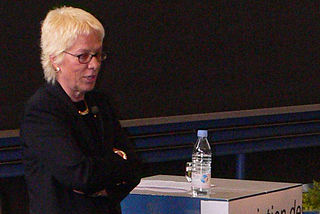
The International Criminal Tribunal for the former Yugoslavia (ICTY) was a body of the United Nations that was established to prosecute the war crimes that had been committed during the Yugoslav Wars and to try their perpetrators. The tribunal was an ad hoc court located in The Hague, Netherlands.

The International Criminal Tribunal for Rwanda was an international court established in November 1994 by the United Nations Security Council in Resolution 955 in order to adjudicate people charged for the Rwandan genocide and other serious violations of international law in Rwanda, or by Rwandan citizens in nearby states, between 1 January and 31 December 1994. The court eventually convicted 61 individuals and acquitted 14.

International criminal law (ICL) is a body of public international law designed to prohibit certain categories of conduct commonly viewed as serious atrocities and to make perpetrators of such conduct criminally accountable for their perpetration. The core crimes under international law are genocide, war crimes, crimes against humanity, and the crime of aggression.

United Nations Security Council Resolution 1901, adopted unanimously on December 16, 2009, after recalling previous resolutions, including 935 (1994), 1503 (2003) and 1534 (2004), the Council noted that the International Criminal Tribunal for Rwanda will not complete its work in 2010.

United Nations Security Council Resolution 1915, adopted unanimously on March 18, 2010, after recalling resolutions 827 (1993), 1581 (2005), 1597 (2005), 1613 (2005), 1629 (2005), 1660 (2006), 1668 (2006), 1800 (2008), 1837 (2008), 1849 (2008), 1877 (2009) and 1900 (2009), the Council, acting under Chapter VII of the United Nations Charter, allowed a temporary increase in judges at the International Criminal Tribunal for the former Yugoslavia (ICTY) to serve beyond the expiry of their term of office to enable them to complete work on cases in which they were involved.

United Nations Security Council resolution 955, adopted on 8 November 1994, after recalling all resolutions on Rwanda, the Council noted that serious violations of international humanitarian law had taken place in the country and, acting under Chapter VII of the United Nations Charter, established the International Criminal Tribunal for Rwanda (ICTR).

United Nations Security Council resolution 977, adopted unanimously on 22 February 1995, after recalling Resolution 955 (1994) in which the council was to determine the seat of the International Criminal Tribunal for Rwanda (ICTR) and noting a report by the Secretary-General Boutros Boutros-Ghali, the council decided that its seat would be in Arusha, Tanzania.
United Nations Security Council resolution 1165, adopted unanimously on 30 April 1998, after recalling Resolution 955 (1994), the council established a third trial chamber at the International Criminal Tribunal for Rwanda (ICTR).

United Nations Security Council resolution 1241, adopted unanimously on 19 May 1999, after noting a letter to the President of the Security Council from the President of the International Criminal Tribunal for Rwanda (ICTR), the Council endorsed a recommendation of the Secretary-General Kofi Annan that judge Lennart Aspegren complete the Georges Rutaganda and Alfred Musema cases which had begun before the expiry of his term of office.

United Nations Security Council Resolution 1932, adopted unanimously on June 29, 2010, after recalling resolutions 955 (1995), 1165 (1998), 1329 (2000), 1411 (2002), 1431 (2002), 1717 (2006), 1824 (2008), 1855 (2008), 1878 (2008) and 1901 (2009) on Rwanda, the Council noted that the 2010 target for the completion of trials at the International Criminal Tribunal for Rwanda (ICTR) could not be met, and therefore extended the terms of 16 judges at the ICTR.
United Nations Security Council resolution 1431, adopted unanimously on 14 August 2002, after recalling resolutions 827 (1993), 955 (1994), 1165 (1998), 1166 (1998), 1329 (2000) and 1411 (2002), the council established a pool of temporary judges at the International Criminal Tribunal for Rwanda (ICTR) in order for it to complete its work as soon as possible.

United Nations Security Council resolution 1482, adopted unanimously on 19 May 2003, after noting correspondence between the President of the Security Council, President of the International Criminal Tribunal for Rwanda (ICTR) and President of the International Criminal Court, the Council extended the terms of office of four permanent judges at the ICTR in order to allow them to dispose of a number of ongoing cases.

United Nations Security Council resolution 1503, adopted unanimously on 28 August 2003, after recalling resolutions 827 (1993), 955 (1994), 978 (1995), 1165 (1998), 1166 (1998), 1329 (2000), 1411 (2002), 1431 (2002) and 1481 (2003), the Council decided to split the prosecutorial duties of the International Criminal Tribunal for the former Yugoslavia (ICTY) and the International Criminal Tribunal for Rwanda (ICTR) which had previously been under the responsibility of one official, Carla Del Ponte, since 1999.

United Nations Security Council Resolution 1955, adopted unanimously on December 14, 2010, after recalling resolutions 955 (1995), 1165 (1998), 1329 (2000), 1411 (2002), 1431 (2002), 1717 (2006), 1824 (2008), 1855 (2008), 1878 (2008), 1901 (2009) and 1931 (2010) on Rwanda, the Council permitted three judges to complete their cases at the International Criminal Tribunal for Rwanda (ICTR) beyond their terms of office, and increased the number of temporary judges at the tribunal.
United Nations Security Council Resolution 1995, adopted unanimously on July 6, 2011, after recalling resolutions 955 (1995), 1503 (2003) and 1534 (2003) on the International Criminal Tribunal for Rwanda (ICTR), the Council permitted temporary judges at the tribunal to vote or stand as candidates in elections to the presidency of the ICTR.

United Nations Security Council Resolution 2006 was unanimously adopted on 14 September 2011.
United Nations Security Council Resolution 1877 was unanimously adopted on 7 July 2009.
United Nations Security Council Resolution 1878 was unanimously adopted on 7 July 2009.
United Nations Security Council Resolution 1824 was unanimously adopted on 18 July 2008.
United Nations Security Council Resolution 1855 was unanimously adopted on 19 December 2008.











